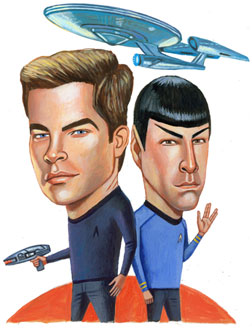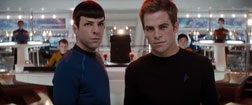Go See Star Trek
It's logical.
To listen to Slate's Spoiler Special about Star Trek, click the arrow button on the player:
You can also click hereto download the MP3 file, or you can subscribe to the Spoiler Special podcast feed in iTunes by clicking here.
J.J. Abrams'Star Trek (Paramount Pictures) is a gift to those of us who loved the original series, that brainy, wonky, idealistic body of work that aired to almost no commercial success between 1966-69 and has since become a science fiction archetype and object of cult adoration. For fans who grew up watching the show in ubiquitous after-school reruns and who commandeered the La-Z-Boy as an impromptu captain's chair, Star Trek is neither a franchise nor a property. It's a world. Abrams' cannily constructed prequel respects (for the most part) the rules of that world and, more importantly, retains the original Star Trek's spirit of optimism, curiosity, and humor.
The near-universal enthusiasm for Abrams' film (it currently has a critical rating of 98 percent on Rotten Tomatoes) may partly spring from sheer relief that it isn't awful. The idea of "rebooting" Star Trek seemed ill-augured, not only because the 40-year-old show has been through so many big- and small-screen recyclings already, but because—well, how do you "reboot" something that's so thoroughly analog? The very charm of the old Star Trek was its low-tech rendering of a high-tech world, with futuristic medical implements represented by salt shakers and aliens fashioned from nothing but green body paint or a glued-on pair of ears.
Star Trek's vision of the future, as guided by creator Gene Roddenberry, was also a relic of its time, the age of NASA and the Cold War and Khrushchev pounding his shoe on a podium at the United Nations. * The show's faith in diplomacy and technology as tools for not just global but universal peace might seem touchingly dated in our post-9/11 age of stateless jihad, loose nukes, and omnipresent danger. Yet in a weird way, Star Trek's cheerfully square naiveté makes it the perfect film for our first summer of (slimly) renewed hope. It's a blockbuster for the Obama age, when smarts and idealism are cool again. In fact, can't you picture our president—levelheaded, biracial, implacably smart—on the bridge in a blue shirt and pointy ears?
Abrams faced two huge challenges in taking on this world. The first was the casting of the archetypal characters—particularly, I'd argue, that of James T. Kirk. As rich a part as the repressed half-alien, half-human Spock is, it's not hard to imagine a contemporary actor suited to play it—after all, Spock's cooler, more contained style somehow fits with the buttoned-up action heroes currently in fashion. (Matt Damon's Jason Bourne and Daniel Craig's Bond both share a Spock-like reserve.) But it's just too galling to imagine William Shatner's creation—that expansive, randy, faintly ridiculous, and yet supremely capable leader of men, Falstaffian in his love of life and largeness of spirit—replaced by a 21st-century-style comic book hero, some glowering brooder with daddy issues.

So Abrams did well to eschew celebrity casting and scour the galaxy to find Chris Pine, a relatively unknown young actor (he appeared in the 2006 crime drama Smokin’ Aces and last year's Bottle Shock) who understands and channels Shatner's loopy appeal without ever impersonating him. (And what actor is more easily impersonatable than Shatner, with that trademark staccato delivery?) Pine is a jewel, but his performance couldn't work without the right ensemble cast. It takes a while for the gang to get fully assembled on the bridge—Simon Pegg's juicily comic Scotty, in particular, comes on the scene too late in the movie. But by the time they do, even Trekkie loyalists will have accepted Zachary Quinto as Spock, Zoe Saldana as communications specialist Uhura (now upgraded from space secretary to "xenolinguist" and equipped with a disconcerting crush on her Vulcan co-worker), Karl Urban as the ship's irascible doctor Leonard "Bones" McCoy (Urban's performance, while enjoyable, comes the closest to straight-up impersonation), and John Cho and Anton Yelchin as the young navigators Sulu and Chekov.
Come to think of it, the Kirk of Abrams' Star Trek does have a daddy issue of sorts, though it's dispatched with early in this brisk 126-minute movie. James' father, Capt. George Kirk, is killed in a collision with a Romulan ship at the same moment that his mother gives birth to their son in a shuttle escaping the blast. The captain of the Romulan vessel, the unsubtly named Nero (Eric Bana), has traveled back in time in order to take revenge for the destruction of his planet, for which he blames Spock … the Spock of the future.
Abrams' creation of a time-travel loop was a demonically clever way to reinvent the Star Trek universe without violating the original 79-episode canon. Hey, he can say to potential detractors at ComicCon, all that stuff that happened on the series still happened; it's just that this alternate reality existed alongside it. Complete bullshit, yes, but oddly in keeping with the original show's love for mind-blowing narrative reversals, and it does silence the nitpickers (not that I would know any or be one myself).
In this alternate reality loop, then, Kirk, a bright but delinquent farm boy in Iowa, is convinced by a Federation officer, Christopher Pike (Bruce Greenwood), to enroll at the Starfleet Academy. Meanwhile on Vulcan, Spock (played as a child by Jacob Kogan) is tormented by Vulcan schoolmates for his half-human ancestry. (The pleasure these boys take in bullying seems human enough to me, but never mind.) As an adult, Spock (now played by Quinto with a few degrees more chill than Leonard Nimoy brought to the role) is offered entry to the elite Vulcan Science Academy—sort of the MIT of space—but chooses to enroll at Earth's Starfleet instead. At the academy, Spock's by-the-book style leads him to clash with the hotheaded and swaggering Kirk. Soon, though, the reappearance of the villainous Nero, now intent on methodically destroying every planet in the Federation, will force the two men to work together on the newly built Enterprise under the command of Capt. Pike (who, more-than-casual fans will note, was the ship's first captain in the series as well). Along the way they will cross paths with the future Spock, played by the present-day Nimoy in a part that's both longer and more crucial to the story than a mere nostalgic cameo.
To say more would be to give too much away, but allowing for a few bad choices (the 37-year-old Winona Ryder as Spock's aged mother? Really?), you couldn't ask for a less ponderous, more rollicking time. The action sequences are grand in scale but staged with a sense for character—it actually matters who's slugging whom atop a hovering Romulan space-drill and why. The score by Michael Giacchino has a hummably ominous hook (only under the closing credits do we finally hear the familiar Alexander Courage theme), and the costumes and sets were designed with a careful eye to detail. Abrams' inspiration was to treat his source material neither as jokey camp nor as sacred scripture, but as a text rich enough to be lovingly retranslated.
Slate V: The Critics on Star Trek, Rudo y Cursi, and Next Day Air
Correction, May 11, 2009: The sentence originally misspelled the name of Khrushchev and did not specify that the famous shoe-pounding incident happened at the United Nations, not in the United States. (Return to the corrected sentence.)

